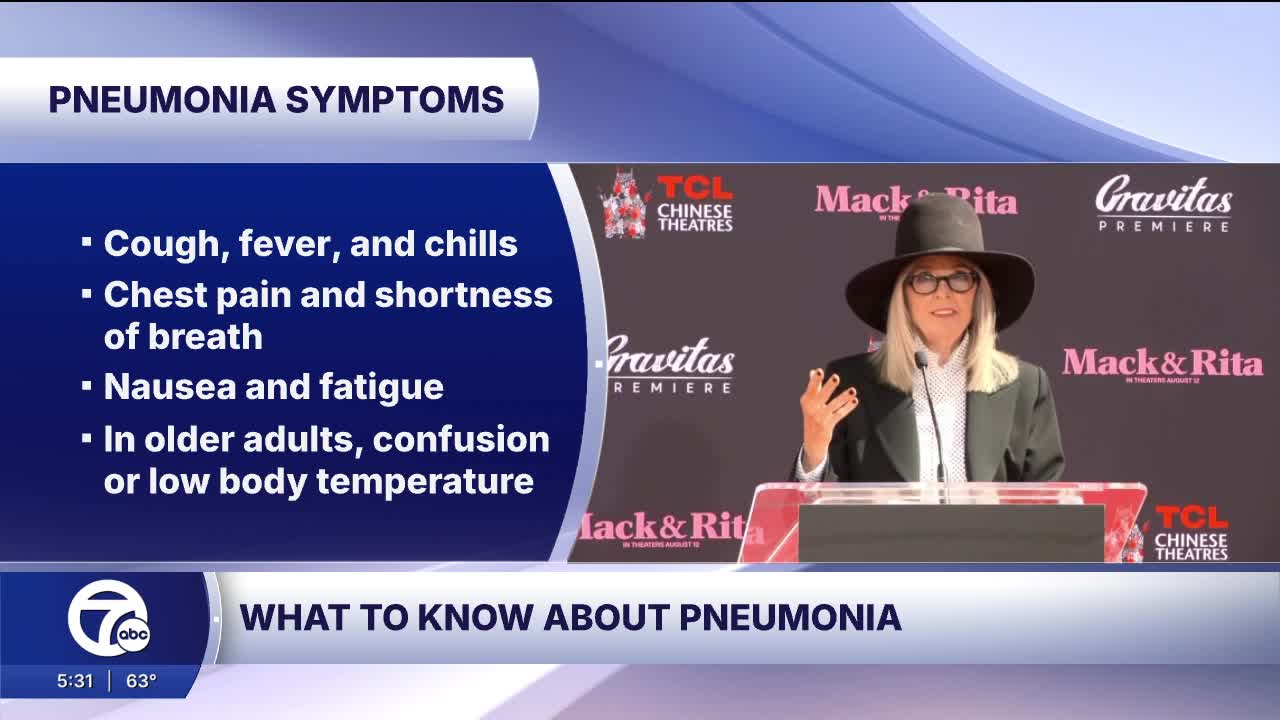(WXYZ) — Diane Keaton’s family has revealed the beloved actress died from pneumonia. The news is a powerful reminder that this infection can be far more serious than many people realize.
Keaton’s death is heartbreaking, and it’s a reminder that pneumonia can affect anyone. It’s an infection that inflames the air sacs in the lungs. They can fill with fluid or pus, making it hard to breathe. What makes it so dangerous is that it often starts out mild. It can feel like a cold, the flu or just a stubborn cough at first.
The main symptoms are cough, fever, chills, chest pain, shortness of breath, nausea and fatigue. In older adults, it can also cause confusion or a lower-than-normal body temperature.
Now, pneumonia is caused by germs — usually bacteria and viruses — that we breathe in every day. Millions of Americans get it every year, and about 55,000 die from it annually. It’s especially dangerous for young children, older adults and anyone with a weakened immune system or chronic illnesses. In these groups, it can turn life threatening. And that may have been what happened with Keaton.
She hadn’t shared any recent medical issues publicly, but reports say her health declined suddenly. At 79, she was in a higher-risk group where recovery can be much harder.
Treatment really depends on what caused it and how severe it is. Doctors may prescribe antibiotics, antivirals and IV fluids. Patients may need fever reducers and cough medicine.
For most healthy people, if you get care early, you can recover fully. But if it’s ignored or untreated, pneumonia can become very serious. And even with treatment, some people can develop complications like sepsis, fluid around the lungs, lung abscess and difficulty breathing, especially those in high-risk groups.
As for prevention, the pneumococcal vaccine is very helpful. It helps protect against the most common bacterial cause of pneumonia. People aged 50 and older are eligible. Also, getting your flu and COVID-19 vaccines can help, since these viruses can sometimes lead to pneumonia.
To lower your risk, keep your immune system strong with regular exercise, good sleep and healthy eating. It’s also important to wash your hands often, not to smoke and to see your doctor right away if you’re having trouble breathing or have a cough that isn’t improving.
Getting care early really can make all the difference. And that’s something I believe Keaton would want people to remember.
This Week on the Dr. Nandi Show

Dr. Partha Nandi, MD, takes a closer look at the effects of food allergies, the challenges of living with them and strategies for prevention. You’ll hear Jen McGregor’s powerful story of growing up allergic to nearly everything she ate — from struggling to find safe foods as a child to coping with unexpected reactions as an adult. Allergist Dr. Gursharan Dhillon also joins the conversation to explain the seriousness of food allergies and what everyone should know to stay safe. Tune in Sunday, Oct. 19 at 5 p.m.




